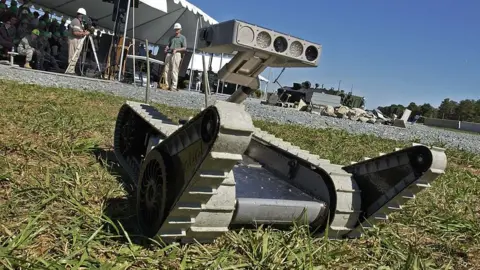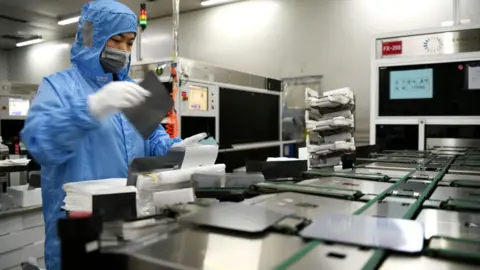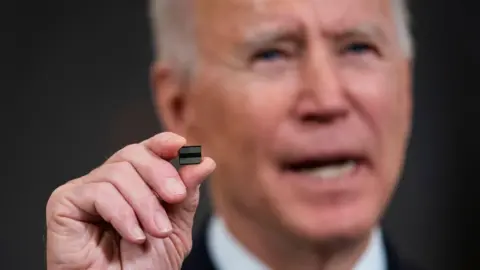Biden urged to back AI weapons to counter China and Russia threats
 Getty Images/Reuters
Getty Images/ReutersThe US and its allies should reject calls for a global ban on AI-powered autonomous weapons systems, according to an official report commissioned for the American President and Congress.
It says that artificial intelligence will "compress decision time frames" and require military responses humans cannot make quickly enough alone.
And it warns Russia and China would be unlikely to keep to any such treaty.
But critics claim the proposals risk driving an "irresponsible" arms race.
"This is a shocking and frightening report that could lead to the proliferation of AI weapons making decisions about who to kill," said Prof Noel Sharkey, spokesman for the Campaign To Stop Killer Robots.
"The most senior AI scientists on the planet have warned them about the consequences, and yet they continue.
"This will lead to grave violations of international law."
The report counters that if autonomous weapons systems have been properly tested and are authorised for use by a human commander, then they should be consistent with International Humanitarian Law.
 NSCAI
NSCAIThe recommendations were made by the National Security Commission on AI - a body headed by ex-Google chief Eric Schmidt and ex-Deputy Secretary of Defense Robert Work, who served under Presidents Obama and Trump.
Other members include Andy Jassy, Amazon's next chief executive, Google and Microsoft AI chiefs Dr Andrew Moore and Dr Eric Horvitz, and Oracle chief executive Safra Catz.
Nuclear limit
Much of the 750-page report focuses on how to counter China's ambition to be a world leader in AI by 2030.
It says that senior military leaders have warned the US could "lose its military-technical superiority in the coming years" if China leapfrogs it by adopting AI-enabled systems more quickly - for example by using swarming drones to attack the US Navy.
 Getty Images
Getty Images"The DoD [Department of Defense] has long been hardware-oriented toward ships, planes, and tanks [and] is now trying to make the leap to a software-intensive enterprise," the report says.
"If our forces are not equipped with AI-enabled systems guided by new concepts that exceed those of their adversaries, they will be outmatched and paralysed by the complexity of battle."
The report predicts AI will transform "all aspects of military affairs", and talks of rival algorithms battling it out in the future.
And while it warns that badly-designed AI systems could increase the risk of war, it adds that "defending against AI-capable adversaries without employing AI is an invitation to disaster".
It does, however, draw the line at nuclear weapons, saying these should still require the explicit authorisation of the president.
And it says the White House should press Moscow and Beijing to issue public commitments of their own over this matter.
'Brain drain'
 Getty Images
Getty ImagesThe commission began its review in March 2019 and this marks its final report.
It says previous warnings about national security threats posed to the US by AI were ignored, but there is still "a window" to carry out proposed changes if President Biden and other politicians act with speed.
But not all its proposals focus on the military, suggesting that the US's non-defence spending on AI-related research and development be doubled to reach $32bn (£23bn) a year by 2026.
Other proposals include:
- creating a new body to help the president guide the US's wider AI policies
- relaxing immigration laws to help attract talent from abroad, including an effort to increase a "brain drain" from China
- creating a new university to train digitally-talented civil servants
- accelerating the adoption of new technologies by the US's intelligence agencies
While the members of the commission serve in a personal capacity, many of the companies they work for have bid for Pentagon and other government AI contracts.
These include a $10bn deal awarded to Microsoft, which Amazon is challenging in court.
Chip limits
The report also focuses on the US's need to restrict China's ability to manufacture state-of-the-art computer chips.
"If a potential adversary bests the United States in semiconductors over the long term or suddenly cuts off US access to cutting-edge chips entirely, it could gain the upper hand in every domain of warfare," the report states.
It advises that the US must keep at least two generations ahead of China's micro-electronics manufacturing capabilities.
 Getty Images
Getty ImagesTo do this, it says the government needs to offer large tax credits to companies which build new chip fabrication plants on US soil.
And it says export restrictions need to be put in place to prevent China being able to import the photolithography machines required to make the most advanced types of chips with the smallest transistors.
This, it says, will require the co-operation of the governments of the Netherlands and Japan, whose companies specialise in these tools.
In addition, the report says US firms that export chips to China should be compelled to certify they are not used to "facilitate human rights abuses", and should submit quarterly reports to the Department of Commerce listing all chip sales to China.
This follows allegations that chips from American firms Intel and Nvidia were used to conduct mass surveillance against China's Uighur ethnic minority in its Xinjiang region.
Chip tensions
President Biden has already ordered a review of the US semiconductor industry, and last week pledged support for a $37bn plan by Congress to boost local output.
 Getty Images
Getty ImagesMinds are being focused by a current shortage of chips affecting the automobile industry.
But China also views the matter as critical to its own ambitions, and earlier on Monday its Ministry of Industry and Information Technology promised to "vigorously support" its own chip-makers.
Beijing has previously said it wants to produce 70% of locally-used chips by 2025.
China's semiconductor-makers have been seeking out second-hand photolithography equipment to do this, buying up as much as 90% of available stock, according to a report in Nikkei Asia.
However, these older machines are not capable of producing the most advanced chips, which are prized for use in both the latest smartphones and other consumer gadgets, as well as military applications.
